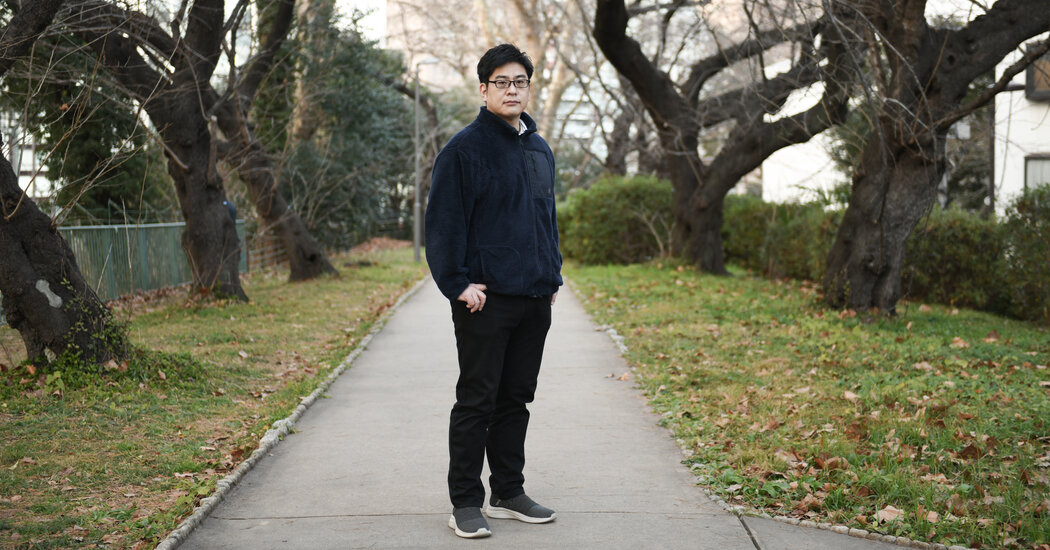Makoto Watanabe hasn’t ever forgotten the day when his earlier employer, considered one of Japan’s greatest newspapers, retreated from its greatest investigative scoop in regards to the Fukushima nuclear crisis: that staff had fled the plant towards orders from the plant’s supervisor.
It was once 11 years in the past, and the Asahi Shimbun had come under fire from different media and executive supporters, who stated the newspaper had misrepresented what had been simply garbled directions. After proclaiming that it stood at the back of the tale, the Asahi did an abrupt about-face at a information convention and retracted it.
The newspaper later gutted the investigative team he labored on that produced the object, telling journalists to be much less contentious towards government. Mr. Watanabe surrender his activity on the main newspaper, a unprecedented transfer in Japan. However what he did subsequent was once extra abnormal: Mr. Watanabe began Japan’s first media nonprofit devoted to investigative journalism.
“The newspaper was once extra interested by protective its privileged get right of entry to than informing its readers,” Mr. Watanabe, 50, recalled. “I sought after to make a brand new media that wouldn’t fold.”
8 years later, his Tokyo Investigative Newsroom Tansa stays small. Because the editor in leader, he supervises a body of workers of 2 full-time journalists, a volunteer and an intern. On a contemporary afternoon, they labored in a spartan room with two small tables and bookshelves on the second one flooring of a nondescript Tokyo workplace construction.
However Tansa, which more or less interprets as “in-depth investigation,” is after all creating a mark. Ultimate yr, it revealed a chain of articles that exposed decades of forced sterilizations of mentally disabled other people, forcing the federal government to factor an apology and move a legislation to pay repayment to the sufferers. Japan’s public broadcaster, NHK, signed a deal to make use of a few of Tansa’s content material.
The nonprofit, which had a 2024 price range of 60 million yen, or about $400,000, was once funded solely through donations and personal grants, has noticed a gradual build up within the selection of readers supporting it with per thirty days contributions. Mr. Watanabe plans to rent two new reporters this spring, together with one from every other large newspaper.
“Individuals are beginning to acknowledge that we stand for one thing other,” Mr. Watanabe stated, sitting in his newsroom whilst a reporter close by scanned a web based archive for information on commercial pollution.
Like Mr. Watanabe, the journalists had been drawn through the risk to do extra unbiased journalism and search out voices unnoticed through Japan’s mainstream press. “Simplest at Tansa do we begin tales through asking, ‘Who’s harm through this?’” stated Mariko Tsuji, a reporter who left a distinguished mag to enroll in the nonprofit.
It’s an method that Mr. Watanabe stated is going again to an revel in in heart college, when he noticed classmates selecting on a lady with bodily and psychological disabilities. Outraged, he wrote an outline of ways the habits was once hurting her emotions and posted it on a faculty wall. To his personal marvel, the bullying stopped.
“It taught me that I may just convey trade with phrases,” he stated.
A long time later, Mr. Watanabe nonetheless has the cherubic options of a boy on a playground, with the power and eagerness to compare. But it surely was once via trial and mistake that he discovered his interest for difficult authentic narratives, which stays uncommon in Jap journalism.
He skilled the primary thrill of journalism when he joined the Asahi in 2000, after operating in brief at a tv community. He uncovered vote purchasing in rural spaces and screw ups through air site visitors controllers that led to close to misses.
In reputation of his scoops, the Asahi authorized his request to enroll in a brand new team that the newspaper created to adopt longer-term investigative initiatives. He liked the liberty to leap from subject to subject, however as he did so, he began operating into resistance inside his personal newspaper.
He was once stepping at the ft of journalists on the newspaper who had been stationed within the so-called press golf equipment, which have been workplaces within the executive businesses that they coated. Those Asahi journalists complained internally about his team’s essential tales angering their resources, however Mr. Watanabe brushed aside them as too depending on government for info.
In Might 2014, the gang revealed the Fukushima scoop, which rival media and political supporters of then-High Minister Shinzo Abe faulted as overly sensational. The click membership journalists inside of Asahi, whose resentments have been construction, used this to strike. Mr. Watanabe stated they satisfied the newspaper to disavow the object 4 months after it seemed and later to disband the investigative team.
In accordance with questions, the Asahi stated that it had made a renewed push into investigative journalism led through a special phase of the newspaper.
Mr. Watanabe joined every other ex-Asahi reporter in launching the startup, which they to start with named the Waseda Chronicle after a school that gave them early fortify. They made it a nonprofit to exhibit their autonomy — from each company sponsors and the political established order.
“We would have liked to turn that we stand subsequent to our readers out of doors the circle of energy,” Mr. Watanabe stated.
To pressure that time house, the nonprofit tackled media corruption in its first sequence of articles, which uncovered bills made to primary information corporations through a large promoting company in trade for sure protection of its shoppers.
Ever since, Mr. Watanabe has showcased deeply reported investigations now not noticed in maximum mainstream media. In a present sequence about chemical air pollution through a significant producer, Tansa has revealed 75 articles. Any other sequence, a couple of suicide led to through bullying at a highschool in Nagasaki, has reached 48 installments.
Whilst the co-founder later left, Mr. Watanabe caught with the tiny operation regardless of its reporting being unnoticed through established order reporters. It has taken years, however Tansa is after all beginning to stand out in a media panorama that has lengthy been ruled through legacy newspapers and tv networks.
Tansa may be profitable reputation out of the country, the place it’s the most effective investigative nonprofit from Japan within the Global Investigative Journalism Network, a world team with some 250 individuals.
“Japan continues to be managed through established media that don’t give different narratives any house,” stated William Horsley, the global director of the Centre for Freedom of the Media on the College of Sheffield. “Tansa is an exception that fills the space.”
Mr. Watanabe hopes the journalists he’s recruiting will permit him to do extra cross-border collaborations. However he additionally sees hurricane clouds at the horizon at house. Like different portions of the arena, right-wing populism and media-bashing politicians are emerging in Japan, and final yr police within the town of Kagoshima raided a small online media after it revealed tales criticizing an investigation.
In such an more and more adversarial surroundings, “the desire can be more potent than ever for a media outlet that gained’t give up,” he stated.



